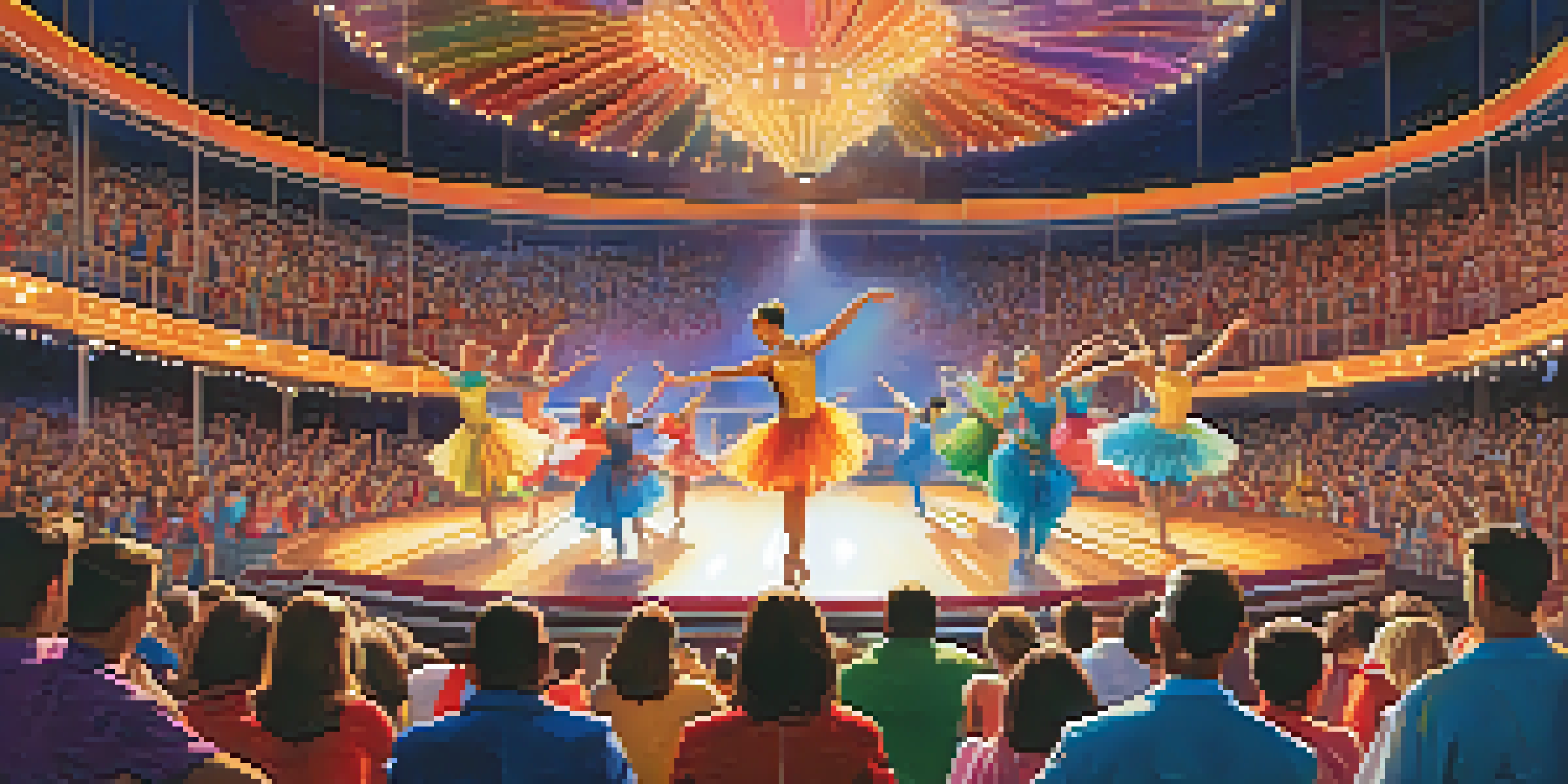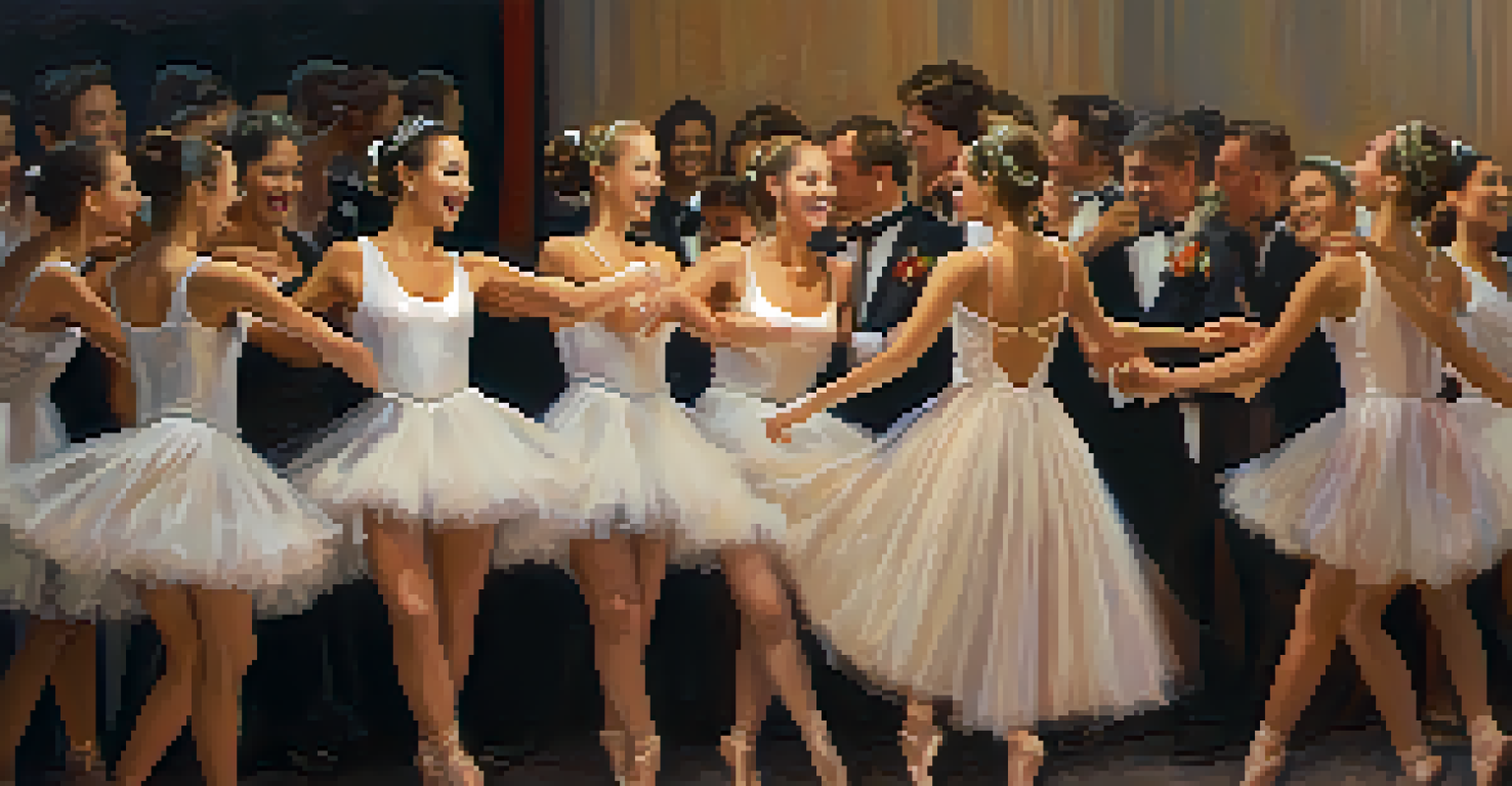The Importance of Dance Competition Etiquette for Success

Understanding Dance Competition Etiquette Basics
Dance competition etiquette is crucial for performers looking to shine on stage. It encompasses a set of unwritten rules that help maintain respect and professionalism among dancers and judges alike. Think of it as the dance world's version of table manners; just as you wouldn't chew with your mouth open, you want to handle yourself gracefully in a competitive setting.
Dance is the hidden language of the soul.
From the moment you arrive at the venue, your behavior sets the tone for your experience and the perception others have of you. Simple actions like being punctual, dressing appropriately, and treating everyone with kindness go a long way. These small gestures not only enhance your own reputation but also reflect positively on your dance team or studio.
Ultimately, understanding the basics of etiquette can make a significant difference in how you're viewed by judges and fellow competitors. It creates an atmosphere of camaraderie, transforming a competitive environment into one that fosters mutual respect and admiration.
Respecting Fellow Competitors and Their Efforts
In the world of dance competitions, it's vital to remember that everyone is there to showcase their hard work and passion. This means respecting your fellow competitors, regardless of their skill level. After all, every dancer has put in countless hours of practice, and acknowledging their efforts can foster a positive environment.

You can show respect in various ways, such as cheering for others during their performances and celebrating their achievements, no matter how big or small. Instead of engaging in negative talk or comparisons, focus on uplifting those around you. This camaraderie can create a supportive atmosphere that enhances everyone’s performance.
Respect Is Key in Competitions
Showing respect to fellow dancers fosters a supportive environment that enhances everyone's performance.
Moreover, fostering a spirit of respect doesn't just benefit your competitors; it also reflects well on you. Judges often observe interactions among dancers, and a positive attitude can set you apart as a true professional in the eyes of the adjudicators.
The Role of Preparation in Dance Competition Success
Preparation is key to excelling in dance competitions, not just in terms of your routine but also regarding your conduct. Being prepared means knowing the competition schedule, having your costume and props ready, and understanding the rules of the event. This level of preparedness allows you to focus entirely on your performance.
Success is not just about what you accomplish in your life, it’s about what you inspire others to do.
Moreover, practicing good etiquette in preparation can alleviate unnecessary stress. When you arrive on time and have everything organized, you can approach your performance with a calm and confident mindset. This preparation shines through on stage, making your performance even more impressive.
Remember, preparation is about more than just rehearsing your dance moves; it’s about being mentally and emotionally ready to engage with your environment and fellow dancers. Being well-prepared fosters an atmosphere of respect and professionalism, which can lead to greater success.
Building Positive Relationships with Judges
Judges play a pivotal role in dance competitions, and establishing a positive relationship with them can significantly impact your experience and results. While it’s essential to respect their authority, being approachable and friendly can set you apart as a competitor. A smile and a simple thank you can leave a lasting impression.
Engaging with judges doesn’t mean you should seek favoritism; rather, it’s about showing that you appreciate their time and expertise. Understanding that judges often have to manage multiple dancers and routines can help you empathize with their role, fostering a respectful connection. This, in turn, can create a more enjoyable atmosphere for everyone involved.
Preparation Drives Performance Success
Being well-prepared allows dancers to focus on their performance and engage positively with their environment.
Additionally, after the competition, don’t hesitate to thank the judges for their feedback and guidance. This shows maturity and professionalism, qualities that judges admire and remember when assessing future performances.
Maintaining Professionalism During Performances
Professionalism during your performance is crucial, as it reflects not only on you but also on your dance team. This includes everything from your stage presence to how you interact with others backstage. When you step onto the stage, it’s your time to shine, and maintaining a professional demeanor can enhance the overall experience.
Focusing on your routine, despite any distractions or mishaps, demonstrates resilience and dedication. Similarly, it’s important to stay composed and avoid negative body language, such as rolling your eyes or frowning when others are performing. Instead, show enthusiasm and support for your fellow dancers.
Remember, the way you conduct yourself while performing sends a message to both the audience and the judges. Embracing professionalism can elevate your performance and make you stand out in the competitive scene.
The Importance of Feedback and Constructive Criticism
Competing in dance is about growth, and embracing feedback is essential for development. Judges provide critiques to help dancers improve, and approaching this feedback with an open mind is a sign of maturity. Instead of seeing critiques as criticism, view them as valuable insights that can enhance your skills.
After the competition, take time to reflect on the feedback you receive. Discussing observations with your dance coach and peers can help you understand different perspectives and identify areas for improvement. This collaborative approach fosters a supportive environment that encourages growth and learning.
Embrace Feedback for Growth
Viewing judges' critiques as constructive insights leads to personal development and inspires those around you.
Moreover, actively seeking feedback shows initiative and a desire to excel. When you demonstrate a willingness to learn from both successes and setbacks, you not only improve as a dancer but also inspire those around you to adopt a similar mindset.
Creating a Positive Atmosphere Backstage
The backstage environment can be just as crucial as the performance itself. Creating a positive atmosphere among competitors fosters support and camaraderie, making the experience enjoyable for everyone. Simple acts like sharing a laugh or offering words of encouragement can lighten the mood and reduce pre-performance jitters.
Additionally, being mindful of noise levels and respecting each other's space backstage is vital. When everyone is considerate, it creates a more harmonious setting that allows dancers to focus on their routines. This collective respect can significantly enhance the overall experience for all involved.

Ultimately, a positive backstage atmosphere can influence your performance. When you feel supported and uplifted by your fellow dancers, it can translate into confidence and joy on stage, making the competition a memorable and rewarding experience.
Embracing Sportsmanship in Dance Competitions
Sportsmanship is a vital aspect of any competition, including dance. It embodies the spirit of fair play, respect, and humility, regardless of the outcome. Embracing sportsmanship means congratulating winners, being gracious in defeat, and always maintaining a positive attitude.
When you demonstrate sportsmanship, you set an example for others, contributing to a culture of respect and support in the dance community. This attitude not only enhances your own experience but also uplifts those around you, creating an environment where everyone feels valued.
Furthermore, sportsmanship allows you to enjoy the journey of dance competitions beyond the results. When you appreciate the effort and artistry of your peers, you cultivate a spirit of community that enriches your dance experience, ultimately leading to personal and collective growth.